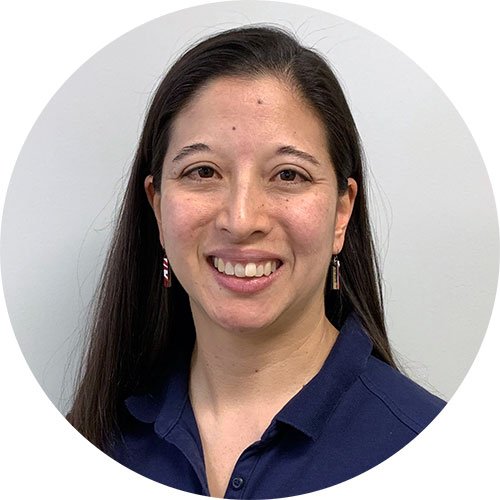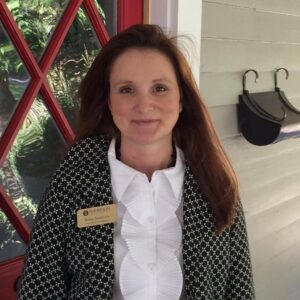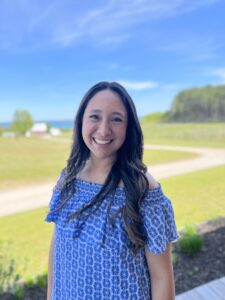
Lindsey Bomgren, Founder of Nourish Move Love
Lindsey Bomgren Founder of Nourish Move Love This month at Women and Work we are going to feature Lindsey Bomgren, founder of Nourish Move Love.
Women & Work
Julie Buck
Clinical Director of Youth Programming at Overdose Lifeline

Julie is the Clinical Director of Youth Programming at Overdose Lifeline, where she provides clinical support and oversight for Camp Mariposa Aaron’s Place and Aaron’s Place Exchange (APEX). She graduated from Indiana University with a Master of Science in Occupational Therapy. Julie specializes in pediatrics and family care, including behavioral health, sensory processing, developmental delays, and community based services. In addition to her passion for supporting families impacted by substance use disorder, Julie loves cooking, traveling, being in nature.
Here at Women and Work we are excited to feature Julie Buck on our blog this month. Julie, please share with us a little bit about yourself and what work God currently has you involved in.
Thank you for having me! I grew up in central Indiana, but moved to Colorado for college, followed by Washington State, and Alaska. I spent time nannying, working in ministry, and owning/running a moving company with my husband before returning to graduate school to study occupational therapy. I have practiced as a pediatric occupational therapist for the past 10 years, initially specializing in developmental delays and sensory processing, but I have now expanded to focus on pediatric mental health and addiction. I currently live in Indianapolis, IN, where I work as the Clinical Director of Youth Programming at Overdose Lifeline, a non-profit organization dedicated to providing advocacy, support, and education related to substance use disorder and addiction. We have a number of programs including distribution of harm reduction tools such as naloxone and fentanyl test strips, a recovery home for pregnant women, support groups for those who have lost a loved one to overdose ,as well as support groups for those who are currently walking through addiction with a loved one. My role focuses on providing clinical support and direction for Camp Mariposa Aaron’s Place, a free, year round mentoring and addiction prevention program for children ages 9-12 who have been impacted by a family member’s substance use disorder, as well as APEX, an after school program designed for youth ages 13-17 who have been impacted by a family member’s substance use disorder.
I did not see myself doing this work when I graduated from OT school. In fact, it was the furthest thing from my mind. For many years, my husband, Greg, had been an active alcoholic, however, it was not something we discussed or allowed others to see openly. I wasn’t in a space to acknowledge the full extent of his struggles and I knew I couldn’t step into a professional space where I was asking my clients to do something I wasn’t willing to do. I was happy to keep my personal and professional worlds separate until Greg began struggling not just with alcohol, but also pain medication. Over several years, his struggles escalated into full blown heroine addiction, finally ending in a fatal overdose. As I began to heal from the grief of losing Greg, as well as the trauma of walking through addiction with him, I felt God calling me to step into the world of trauma and mental health more and more. Bit by bit, He began opening doors, eventually leading me to Overdose Lifeline and my current position.
How did you come to recognize the gifts God has given you and how do you seek to represent Christ and image Him through your work?
I have been very fortunate to have a number of awesome mentors in my life. Not only did they share their knowledge and expertise with me, but they saw things in me that I did not. One mentor, in particular, had a way of gently pushing me into the mental health and addiction realm and was responsible for connecting me with Overdose Lifeline. To this day, she pushes me to engage professionally in ways that feel scary and overwhelming, including giving presentations, co-teaching a graduate course with her, and taking on new projects with Overdose Lifeline.
I aim to represent Christ by having a posture of humility, acceptance, and love. God has given me a very even tempered demeanor that allows me to create a safe space for those I interact with. I have found that people are able to be themselves with me, no matter how messy that might be. My aim is less about trying to fix circumstances and more about being WITH those I work with and serve, letting them know that they are seen and cared about.
How do you keep yourself encouraged that the work you’re doing is valuable and worthwhile when the world tempts women to believe otherwise? Are there any Scriptures God has given you to keep you encouraged in your work?
Within our camp and teen programs, we use the 7 C’s as part of our curriculum. This states, “I didn’t CAUSE it, I can’t CONTROL it, I can’t CURE it, but I can take CARE of myself, by COMMUNICATING my emotions, making good CHOICES, and CELEBRATING myself.” We teach the kids that they didn’t cause their family members’ addiction and they can’t cure it, but there are healthy habits that they can learn and grow in. Similarly, I didn’t cause and I can’t control or cure the brokenness I experience in my work, but I can bring my emotions to God in lament, I can choose to be diligent in the work He’s given me, and I can celebrate the many ways He reminds me of His goodness, grace, and sovereignty. One of my life verses is Colossians 1:17, “And he is before all things, and in him all things hold together.” This verse reminds me that it is not my job to hold it all together, only God can do that. It’s simply my job to be faithful with the roles He has given me.
What are some challenges you have experienced and how have you seen God at work around you despite them?
Sometimes the heaviness of working within the world of addiction after already experiencing so much loss as a result of addiction is challenging. It can be tempting to pretend I have it all together and just push through. Instead, I’ve worked hard to be honest about where I’m at emotionally and to be vulnerable with my team and even my kids, when appropriate. I have found that God has used this vulnerability to help create a work/camp culture in which we don’t try to have it all together, but we can be real about our weaknesses and still be valuable to
the team and our community.
Your personal story is very much tied to your work. How have you seen God’s faithfulness in your life in the midst of the trials and blessings that have come your way?
So, so many ways!! Looking back, I can see all the ways God was providing for me and preparing me for the work He has me doing. I have had an amazing support system, both when Greg was struggling with addiction and after his death. My community continually points me back to the Gospel, God’s sovereignty and the power of lamenting. Probably the greatest testament of God’s faithfulness has come in my relationship with my husband, Paul. In him, God has provided a partner, who sees my talents and successes, but also sees my weaknesses, my grief, my struggles. He steps into the messy parts of me and encourages me to rest when it’s time to rest and gives me the support to press in when that’s what’s needed. He points me back to God in his words and actions and sacrificial love. He also joins me at camp weekends, where the kids adore him!
How would you encourage our readers if they are a support person for someone in the midst of addiction or recovery? What are some resources you can recommend?
1. I would encourage them to be honest about where they are at and how they are struggling. This includes being honest with themselves and honest with those closest to them. I wish I had realized when I was going through it that I wasn’t the only one in my shoes. The devil is really good at making us believe we are all alone, that no one has a clue how we feel. There is power in sharing your story and allowing others to see you, even the broken parts.
2. I would encourage them to get help. This could be through a support group, a counselor, a pastor, or a therapist. You can’t help your loved one if you are running on empty. CRAFT is an evidence based support group for those who love someone struggling with addiction. You can find a CRAFT group within Indiana here: https://www.overdoselifeline.org/craft-model/.
3. I would encourage them (and their loved one) to carry naloxone, a nasal spray that can be used to treat a narcotic overdose in an emergency situation. This is a form of harm reduction that can prevent fatal overdoses and provides those with addiction another chance at recovery. In Indiana, it is free to the public. You can go to https://www.overdoselifeline.org/indiana-naloxone-request-report to request naloxone or use this tool to find naloxone near you: https://www.overdoselifeline.org/naloxone-indiana-distribution/.

Lindsey Bomgren Founder of Nourish Move Love This month at Women and Work we are going to feature Lindsey Bomgren, founder of Nourish Move Love.

Robyn Sanderson Associate Vice President for Student Development at Anderson University At Women and Work we are honored to feature Robyn Sanderson as our Work

Fernie Cosgrove Child Welfare Social Worker Supervisor It is our pleasure to feature Fernie Cosgrove, our book club coordinator as our Work Done Well Feature.